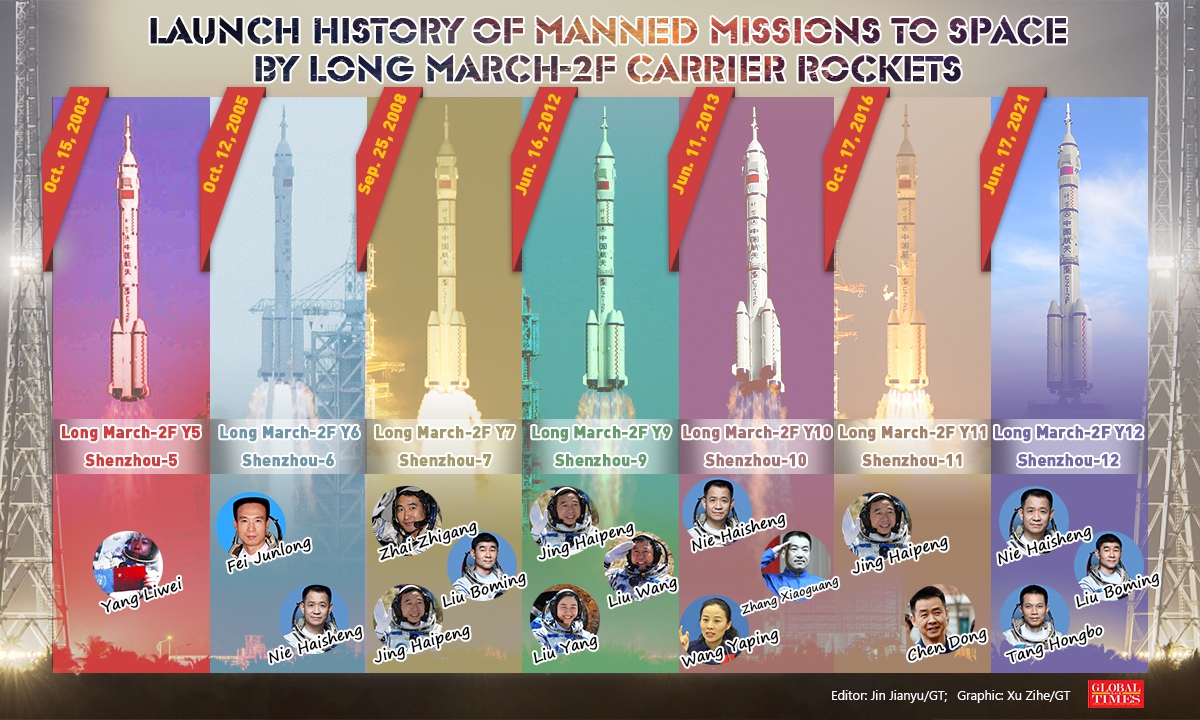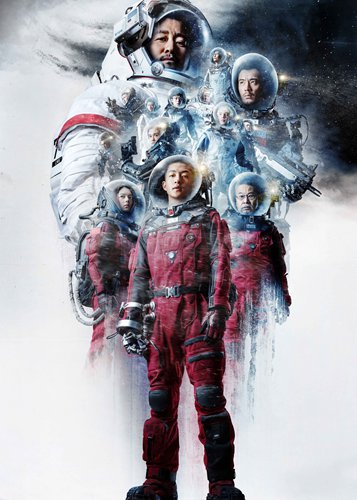China`s „Space dream“ on its Space Odysee : Stairway to Heaven?
Launch history of manned mission to space by Long March-2F carrier rockets By Global Times Published: Jun 17, 2021 11:14 AM 
Launch history of manned mission to space by Long March-2F carrier rockets. Graphic: GT
https://www.globaltimes.cn/page/202106/1226375.shtml
A Chinese probe has landed on Mars and is carrying out its research work, examining the composition of the soil, the geological structure, the climate. Is that something special? Absolutely. Many probes have already researched there, but they all came from the USA. The Soviet Union had also sent some probes, but none of them survived the landing unscathed. China, on the other hand, whose Mars program just started in 2016, succeeded on the first attempt. In addition, exactly according to plan: the Martian rocket was supposed to take off in 2020, and so it happened. On May 14, 2021, „Tianwen-1“ landed on the neighboring planet, where it has been collecting information for three months. Has China taken another crucial step in overtaking the US?
As in India, Chinese space travel had been set on track by the Soviet Union. During the post-Soviet period, cooperation with Russia played a major role. In return for the Chinese promise not to sell any more missiles to Pakistan in the future, the USA lifted its ban on the export of satellite technology to China in 1994. However, they did not allow Chinese cosmonauts to participate in the „international“ space station ISS, which orbits the earth. China has therefore built and operated its own space laboratories. “Tiangong-1” was the first laboratory to orbit the earth between 2011 and 2018 and was manned for the first two years. „Tiangong-2“ was in operation between 2016 and 2019, the manning in the starting year was the longest up until then. Now, a month and a half ago, construction began on a permanent station and it should be ready for operation next year.
The development of Chinese space travel initially had primarily military purposes, as was the case in the Soviet Union. In October 1956, a research institute of the Ministry of Defense was founded for this purpose, the first short-range missile was launched at the end of 1960 – the year of the political break with Soviet „revisionism“ – and the first medium-range missile followed in 1964, the year China became a nuclear power.. The first real space missile, a three-stage launcher with the revolutionary name „Long March 1 ”, in 1969 stayed up for about a minute. The first satellite was launched in 1970, and in 1975 a payload could be brought back to earth for the first time. In 2003, cooperation with the EU on scientific satellites began, the expansion of a purely Chinese satellite navigation system was tackled and the first manned space flight took place, after plans had existed since 1966. It has existed in the form of a program since 1992. The first orbit of the moon with a probe was achieved in 2007. In 2013, another probe landed on the lunar surface and was able to send experimental data back to Earth from there. The landing of such a device on the back of the moon succeeded in January 2019, this had never happened before.
In 2020, rock samples were collected from the moon and returned to Earth, including uranium. The prospect of extracting important raw materials, not least rare earths, and that also in the asteroid belt, is currently the strongest driving force behind space development, not just in China. Around 150 quadrillion tons of titanium are said to be stored on the moon alone. Since the end of 2020, however, plans to build an international lunar research station have also been pushed forward, in cooperation with Russia and the United Nations Space Office. The technologies for building such a station are to be tested from 2024. The manned scientific and economic exploration of the moon is to begin in 2030. Manned stations must also provide an answer to the question of whether parts of humanity could spend their lives on other celestial bodies, especially Mars.
In communist China, which for so long had taken action against overpopulation with the very radical means of the one-child policy – despite all the upheavals described by Nobel Prize winner Mo Yan in his novel Frogs (2009) – these explorations may have been particularly obvious. In any case, Robert Jungk, the well-known futurologist, reports in his memoir from a world conference of the World Future Studies Federation in Beijing in 1988 that the hosts, “Chinese institute directors, professors and officials”, saw each other in advance of “huge high-tech designs”: “ The only way out of a great famine caused by overpopulation, global pollution and worldwide unemployment is the quick and energetic preparation for the emigration of billions into the vastness of space, claimed for example professor Boa Zhong-Hang. “ Perhaps one thinks differently today, there are known ways to stabilize the earth’s population at a certain level.
We are now hearing that the Chinese Mars program has primarily scientific goals, rather than economic goals like the lunar program. That may be the reason why it picked up speed quite late – the financing did not seem to be a priority. But it would also have been pointless to force the Mars program at a time when the possibility of extraterrestrial life had not even been tested on the moon, which the US astronauts had reached in 1969 in 76 hours, while on the outward flight to Mars with today available technology would take about nine months. China had to catch up, but even today it is not trying to win quick wins in competition with the US. That in itself is a sign of strength. The United States did not have it in the 1960s, as they staged their manned flight to the moon as a victory over the Soviet Union. Because it was clear to all observers at the time that placing so much value on such a goal at such an early point in time was grossly contrary to an immanent logic of the gradual development of space capacities. It was basically a waste of funds.
China doesn’t need that. The shrill tones of haste can still be heard from the USA today – this time from capitalists like Elon Musk, who arouses the expectation of manned flights to Mars in the very near future – not so from China. Although there is private capitalist participation in the space programs too. And although Xi Jinping, the Chinese President, has been speaking of the “space dream” since 2013, “which we tirelessly pursue” in order to “explore the infinite vastness of space”. When US President John F. Kennedy got his compatriots in the mood for the moon mission in 1961, he had spoken very similarly.
China’s programs are popular with the population; the high costs, which Kennedy could only justify by fighting the Soviet Union, are approved in present-day China for the sake of the cause. The communist leadership tried to do this, with great success because it took account of the popular myths. A launcher rocket still adorns itself today with the Maoist revolutionary name “Long March”, but the rockets, probes and laboratories have increasingly been named based on old traditions. The first manned spaceship was called „Shenzou“, the „godship“, the lunar probes were called „Chang’e“ after the Chinese moon goddess who lives with the jade rabit in a palace on the earth’s satellite, and the name of the one currently on Mars working probe, „Tianwen“, translated means „heavenly question“ in allusion to a poem by Qu Yuan, who was born around 340 BC; it is considered by some to be the oldest Chinese art document at all.
But anyone who thinks that such names reflect a reactionary course of the party, which has long been referring to Confucius, should be reminded that as early as 1965 Mao Zedong quoted Li Bai, who lived in the eighth century AD, with the words “We can go up the sky and bring the moon down ”. But is this memory really necessary? Anyone who has ever read the “Mao Bible”, that little red book, knows how much the revolutionary leader liked to quote old folk myths. The cultural difference between China and the West plays a big role in all of this. The Christian concept of “heaven” contains a strongly hostile note, although it does not stop there. In Petrus’s letter2 we read that the “present heavens” and the earth are “hoarded for the fire”, “kept for the day of judgment”, from which the church father Augustine made that there will be those who were saved at the time when the earth burns, are already flying away from her. This tendency was handed down in the era of secularization and ensured that space travel was associated with notions of flight from the earth. The downside was a more anti-ecological attitude – whoever leaves the earth does not need to save it. The churches of today speak of the “preservation of creation”, but this is a recourse to the Old Testament, which comes too late and can no longer reach us secularized people.
The Chinese tradition is quite different, in which heaven and earth relate to one another like yin and yang, and man and woman as well, a contradiction, but determined to work together. So one wonders whether space travel and ecology could harmonize in China. Of course, it also serves the infinite economic growth there, which is so ecologically devastating. Should it be outsourced to the Moon and Mars?However, if the CPC has such philosophical intentions remains to be seen and one should not forget that parts of the Chinese space program are also for military use including ICBMs, killersatellites , anti-satellite weapons and other military space devices. NATO has also for the first time introduced China as a threat including space and cyberspace and is expanding NATO´s defense obligation in article 5 to space attacks.
As China now wants to go to the moon and Mars and is planning further cosmological space flights, it alsoproduces propaganda movies in order to get its people and the world used to China as a new sea and space power. China has now released the first science fiction blockbuster that will also be shown in western cinemas: “Wandering Earth”. Since the earth is threatened by the collapsing sun, the existing world government (President probably a Chinese ?!) decides to relocate it to a different solar system than planets. For this purpose, people will be relocated underground and huge boosters installed around the world to jet the whole planet into the new solar system. Typical for the Chinese – a mega project like the whole New Silk Road and all of humanity (which in the film remains quite Chinese) is involved. American science fiction films, on the other hand, destroy incoming asteroids much more modestly with atomic explosives (asteroid) or repel extraterrestrial invaders, whether they come from space (Independence Day / Transformers / Star Gate ala Däniken) or the depths of the seas (Pacific Rim) . The Chinese are making themselves completely independent of this and are not going on the defensive, but are relocating the entire planet to a different solar system, do not believe in the superiority of extraterrestrial civilizations, but in the superiority of the human race, which under China’s command is not just opening up the new Silk Road and builds a new world, but just shifts the entire planet and its humanity into a new universe by means of human ingenuity and organizational power and superior human civilization and technology .. Furthermore, the people’s newspaper emphasizes heroism; Willingness to make sacrifices for the big cause and family values also play a central role, as does the connection of the people with their country, which is felt to be typical of Chinese culture.
There are other Chinese sci-fi blockbusters, but these are more for the Chinese market. Interesting, when extraterrestrial civilizations come into contact with mankind, they don’t come as invaders like in “Mars attack”or “War of the Worlds”, but instead, like in “Crazy Alien”,throw their ambassador on earth where he is landing in the West, is mistaken for an ape-man and is made to perform as a circus attraction by an Western entertainer. These primitive Westerners – if the extraterrestrial ambassador had been thrown on China, he would probably have been received with dignity and China would have negotiated a win-win situation and a new, cosmological Silk Road with him. In any case, Westerners are not expected to empathize with other civilizations, which is not entirely wrong, although Chinese chauvinism does not differ much from American exceptionalism in terms of arrogance and superiority feelings. The Chinese would probably have welcomed the exterristic ambassador as a barbarian and long-nosed man and treated him as such, but perhaps only to the extent that he could be friendly to the coming world poweragainst the old world power USA, whose position China wants to take over welcome my friend aliens.
The Chinese mainland’s home-grown sci-fi blockbuster, The Wandering Earth also began a limited run in North Amerrica, even though director Frant Gwo told the Global Times that he considers the film “made for Chinese audiences” and not the international market. So far the film has a high grade of 8/10 on IMDb.
“America producers, eager to get their $200 million movies into the lucrative Chinese market, are increasingly looking for Chinese production partners, shooting in Chinese locations, and adding China-friendly characters and plotlines to American movies, even including extra scenes just for the Chinese cuts of films. But simultaneously, China and other countries are moving toward the blockbuster model themselves, creating homegrown films that don’t need to involve American partners at all,” The Verge wrote in its review of the film on Saturday. While The Wandering Earth tackles Hollywood’s familiar end-of-the-world genre head on, Crazy Alien stood out for its ability to mix Chinese-style comedy with Hollywood sci-fi tropes.
The film starts with a leading Western power contacting an alien to establish diplomatic relations, when the alien ambassador is accidently dropped onto the Earth and is mistaken for a monkey by a local entertainer.
The debut of two Chinese sci-fi films at the same time is not a coincidence. According to Gwo, a group of local directors, including himself and Crazy Alien director Ning Hao, studied in Hollywood years ago and were deeply impressed by the industrialization of film production there and aspired to adapt it to the Chinese market.
Following The Wandering Earth and Crazy Alien, another sci-fi blockbuster Shanghai Fortress hit mainland theaters..

Promotional material for The Wandering Earth Photo: VCG

Promotional material for Crazy Alien Photo: VCG